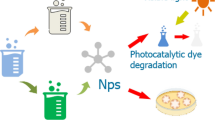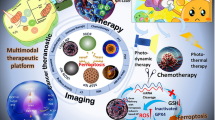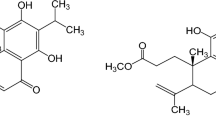Abstract
Resveratrol is a naturally occurring polyphenolic compound exhibiting therapeutic activities. However, the stability can be altered by UV light, pH and changes in temperature. Encapsulation would be an ideal strategy to improve the stability and bioavailability. Thus, trans-resveratrol (Res) was encapsulated within hybrid nanoparticles consisted with silica and G4 polyamidoamine dendrimer (PAMAM) by sol-gel method. The diameters of synthesized nanoparticles (NPs) were at a range of 212–574 nm and the encapsulation efficiency was 86 %. RAW 264.7 murine macrophage cell line induced with endotoxin/lipopolysaccharide was treated with free resveratrol and Res-loaded NPs for assessing inhibition of inducible nitric oxide synthase (iNOS), where IC50 values of free resveratrol and Res-loaded NPs were 122.68 µM and 249.74 µM. As for cytotoxicity, IC50 values of free resveratrol were found as 176.57 µM and 201.54 µM for MCF-7 and MDA-MB-231 cells, whereas 197.16 µM and 219.07 µM for Res-loaded NPs for the respective cell lines. Overall, sol-gel technique proved to be an ideal technology as can be carried out under mild conditions and Res-loaded NPs have potential to be utilized in the industry.


Similar content being viewed by others
References
Zhang G, Zhang H, You W et al (2020) Therapeutic effect of resveratrol in the treatment of osteoarthritis via the MALAT1/miR-9/NF-ƙB signaling pathway. Exp Ther Med 19:2343–2352
Mortreux M, Riveros D, Bouxsein ML, Rutkove SB (2019) A moderate daily dose of resveratrol mitigates muscle deconditioning in a Martian gravity analog. Front Physiol 10:899
Hong M, Li J, Li S, Almutairi MM (2020) Resveratrol derivative, trans-3, 5, 4’-trimethoxystilbene, prevents the developing of atherosclerotic lesions and attenuates cholesterol accumulation in macrophage foam cells. Mol Nutr Food Res 64:e1901115
Sinha D, Sarkar N, Biswas J, Bishayee A (2016) Resveratrol for breast cancer prevention and therapy: preclinical evidence and molecular mechanisms. Semin Cancer Biol 40–41:209–232
Han Y, Jo H, Cho JH et al (2019) Resveratrol as a tumor-suppressive nutraceutical modulating tumor microenvironment and malignant behaviors of cancer. Int J Mol Sci 20:925
Pozo-Guisado E, Alvarez-Barrientos A, Mulero-Navarro S et al (2002) The antiproliferative activity of resveratrol results in apoptosis in MCF-7 but not in MDA-MB-231 human breast cancer cells: cell-specific alteration of the cell cycle. Biochem Pharmacol 64:1375–1386
Zupančič Š, Lavrič Z, Kristl J (2015) Stability and solubility of trans-resveratrol are strongly influenced by pH and temperature. Eur J Pharm Biopharm 93:196–204
Yesil-Celiktas O, Cetin-Uyanikgil EO (2012) In vitro release kinetics of polycaprolactone encapsulated plant extract fabricated by supercritical antisolvent process and solvent evaporation method. J Supercrit Fluids 62:219–225
Ilhan-Ayisigi E, Yesil-Celiktas O (2018) Silica-based organic-inorganic hybrid nanoparticles and nanoconjugates for improved anticancer drug delivery. Eng Life Sci 18:882–892. https://doi.org/10.1002/elsc.201800038
Yulizar Y, Juliyanto S, Sudirman et al (2021) Novel sol-gel synthesis of CeO2 nanoparticles using Morinda citrifolia L. fruit extracts: structural and optical analysis. J Mol Struct 1231:129904
Yesil-Celiktas O, Pala C, Cetin-Uyanikgil EO, Sevimli-Gur C (2017) Synthesis of silica-PAMAM dendrimer nanoparticles as promising carriers in neuro blastoma cells. Anal Biochem 519:1–7. https://doi.org/10.1016/j.ab.2016.12.004
Yesil-Celiktas O, Cumana S, Smirnova I (2013) Silica-based monoliths for enzyme catalyzed reactions in microfluidic systems with an emphasis on glucose 6-phosphate dehydrogenase and cellulase. Chem Eng J 234:166–172
Summerlin N, Qu Z, Pujara N et al (2016) Colloidal mesoporous silica nanoparticles enhance the biological activity of resveratrol. Colloids Surf B Biointerfaces 144:1–7
Sciortino M, Alonzo G, Ciriminna R, Pagliaro M (2011) Sol-gel microcapsulation in silica-based particles: a comparative study. Silicon 3:77–83
Balanč B, Trifković K, Đorđević V et al (2016) Novel resveratrol delivery systems based on alginate-sucrose and alginate-chitosan microbeads containing liposomes. Food Hydrocoll 61:832–842
Wencel D, Dolan C, Barczak M et al (2013) Synthesis, tailoring and characterization of silica nanoparticles containing a highly stable ruthenium complex. Nanotechnology 24:365705. https://doi.org/10.1088/0957-4484/24/36/365705
Wan S, Zhang L, Quan Y, Wei K (2018) Resveratrol-loaded PLGA nanoparticles: enhanced stability, solubility and bioactivity of resveratrol for non-alcoholic fatty liver disease therapy. R Soc Open Sci 5:181457. https://doi.org/10.1098/rsos.181457
Vankayala JS, Battula SN, Kandasamy R et al (2018) Surfactants and fatty alcohol based novel nanovesicles for resveratrol: process optimization, characterization and evaluation of functional properties in RAW 264.7 macrophage cells. J Mol Liq 261:387–396. https://doi.org/10.1016/j.molliq.2018.04.058
Saralkar P, Dash AK (2017) Alginate nanoparticles containing curcumin and resveratrol: preparation, characterization, and in vitro evaluation against DU145 prostate cancer cell line. AAPS PharmSciTech 18:2814–2823. https://doi.org/10.1208/s12249-017-0772-7
Pentek T, Newenhouse E, O’Brien B, Singh Chauhan A (2017) Development of a topical resveratrol formulation for commercial applications using dendrimer nanotechnology. Molecules 22:137. https://doi.org/10.3390/molecules22010137
Chaudhary Z, Subramaniam S, Khan GM et al (2019) Encapsulation and controlled release of resveratrol within functionalized mesoporous silica nanoparticles for prostate cancer therapy. Front Bioeng Biotechnol 7:225. https://doi.org/10.3389/fbioe.2019.00225
Siu FYK, Ye S, Lin H, Li S (2018) Galactosylated PLGA nanoparticles for the oral delivery of resveratrol: enhanced bioavailability and in vitro anti-inflammatory activity. Int J Nanomed 13:4133–4144. https://doi.org/10.2147/IJN.S164235
Sergides C, Chirilă M, Silvestro L et al (2016) Bioavailability and safety study of resveratrol 500 mg tablets in healthy male and female volunteers. Exp Ther Med 11:164–170. https://doi.org/10.3892/etm.2015.2895
Wenzel E, Somoza V (2005) Metabolism and bioavailability of trans-resveratrol. Mol Nutr Food Res 49:472–481. https://doi.org/10.1002/mnfr.200500010
Vaitkuviene A, Ratautaite V, Mikoliunaite L et al (2014) Some biocompatibility aspects of conducting polymer polypyrrole evaluated with bone marrow-derived stem cells. Colloids Surf A Physicochem Eng Asp 442:152–156. https://doi.org/10.1016/j.colsurfa.2013.06.030
Bishayee A, Barnes KF, Bhatia D et al (2010) Resveratrol suppresses oxidative stress and inflammatory response in diethylnitrosamine-initiated rat hepatocarcinogenesis. Cancer Prev Res 3:753–763
Venkatadri R, Muni T, Iyer AKV et al (2016) Role of apoptosis-related miRNAs in resveratrol-induced breast cancer cell death. Cell Death Dis 7:e2104
Meng XP, Wang YF, Wang ZP (2016) Anti-hepatocarcinoma effects of resveratrol loaded solid nanodispersion by a new material nano silica. In: Proceedings of the 2016 6th International Conference on Applied Science, Engineering and Technology. pp 297–302
Wang GJ, Chen YM, Wang TM et al (2008) Flavonoids with iNOS inhibitory activity from Pogonatherum crinitum. J Ethnopharmacol 118:71–78. https://doi.org/10.1016/j.jep.2008.03.005
Granados-Principal S, Liu Y, Guevara ML et al (2015) Inhibition of iNOS as a novel effective targeted therapy against triple-negative breast cancer. Breast Cancer Res 17:25. https://doi.org/10.1186/s13058-015-0527-x
Jiang Q, Yang M, Qu Z et al (2017) Resveratrol enhances anticancer effects of paclitaxel in HepG2 human liver cancer cells. BMC Complement Altern Med 17:477
Hsu HT, Tseng YT, Wong WJ et al (2018) Resveratrol prevents nanoparticles-induced inflammation and oxidative stress via downregulation of PKC-α and NADPH oxidase in lung epithelial A549 cells. BMC Complement Altern Med 18:211
Achy-Brou CAA, Billack B (2016) Lipopolysaccharide attenuates the cytotoxicity of resveratrol in transformed mouse macrophages. Plant Foods Hum Nutr 71:272–276
Park EJ, Park K (2009) Oxidative stress and pro-inflammatory responses induced by silica nanoparticles in vivo and in vitro. Toxicol Lett 184:18–25
Sharma R, Kambhampati SP, Zhang Z et al (2020) Dendrimer mediated targeted delivery of sinomenine for the treatment of acute neuroinflammation in traumatic brain injury. J Control Release 323:361–375
Acknowledgements
This work was supported by TUBITAK 2209-A research project grant (1919B011400901).
Author information
Authors and Affiliations
Corresponding author
Ethics declarations
Conflict of Interest
The authors declare no conflict of interest.
Additional information
Publisher’s Note
Springer Nature remains neutral with regard to jurisdictional claims in published maps and institutional affiliations.
Supplementary Information
ESM 1
(DOCX 17.9 KB)
Rights and permissions
About this article
Cite this article
Kececiler-Emir, C., Ilhan-Ayisigi, E., Celen-Erden, C. et al. Synthesis of Resveratrol Loaded Hybrid Silica-PAMAM Dendrimer Nanoparticles With Emphases on Inducible Nitric Oxide Synthase and Cytotoxicity. Plant Foods Hum Nutr 76, 219–225 (2021). https://doi.org/10.1007/s11130-021-00897-5
Received:
Accepted:
Published:
Issue Date:
DOI: https://doi.org/10.1007/s11130-021-00897-5




